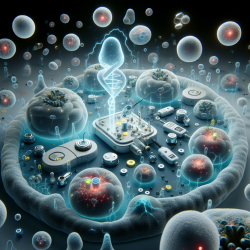The intersection of biology and technology has always been a fertile ground for innovation. One such promising area is the development of biofuel cells (BFCs) that utilize biological processes to generate electricity. The recent research titled "A Metabolic Biofuel Cell: Conversion of Human Leukocyte Metabolic Activity to Electrical Currents" explores how human white blood cells (WBCs) can be harnessed to create electrical currents. This blog post will delve into the findings of this research and discuss how practitioners can apply these insights to improve their skills and encourage further exploration in this field.
The Concept of Biofuel Cells
A biofuel cell is an electrochemical device that converts biochemical energy into electrical energy. Traditionally, microbial organisms have been used as miniature bioreactors for electricity generation in BFCs. The study in question investigates the feasibility of using human leukocytes as bioreactors at a biofuel cell anode, a novel approach that could revolutionize power sources for implantable medical devices.
Research Findings
The study demonstrated that WBCs could generate small electrical currents when introduced into the anode compartment of a proton exchange membrane fuel cell. The cathode compartment contained a potassium ferricyanide solution. The research focused on understanding the electrochemical activity of activated WBCs and elucidating the mechanism of electron transfer between the cells and electrodes.
Cyclic voltammetry was used to investigate this activity, revealing oxidation peaks at about 360 mV vs. SCE for PMA-activated primary cells. Notably, serotonin release from these activated cells was confirmed using high-performance liquid chromatography (HPLC), suggesting its contribution to the observed BFC currents.
Implications for Practitioners
The implications of this research are profound for practitioners working with biofuel cells and implantable medical devices. Here are some ways they can leverage these findings:
- Innovation in Medical Devices: By understanding the potential of leukocyte-based BFCs, practitioners can explore new ways to power low-energy implantable medical devices such as biosensors.
- Further Research Opportunities: The study opens avenues for further research into optimizing electron transfer processes and enhancing current and power densities in BFC applications.
- Interdisciplinary Collaboration: This research underscores the importance of collaboration between biologists, engineers, and medical professionals to develop cutting-edge solutions.
Encouraging Further Exploration
The potential applications of leukocyte-based BFCs extend beyond powering medical devices. They could also contribute to sustainable energy solutions by harnessing biological processes. Practitioners are encouraged to delve deeper into this field by conducting experiments that build on these findings or exploring new materials and methods that could enhance BFC efficiency.
Conclusion
This research represents a significant step forward in our understanding of how biological processes can be harnessed for technological applications. By leveraging the metabolic activity of human leukocytes, we can explore new frontiers in biofuel cell technology and its applications in healthcare and beyond.
To read the original research paper, please follow this link: A Metabolic Biofuel Cell: Conversion of Human Leukocyte Metabolic Activity to Electrical Currents.










